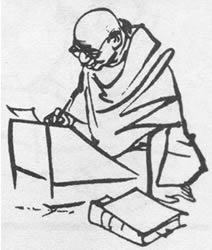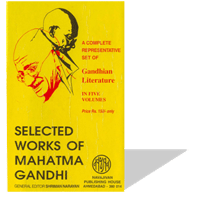
P.O. SEVAGRAM, DIST.WARDHA 442102, MS, INDIA. Phone: 91-7152-284753
FOUNDED BY MAHATMA GANDHI IN 1936
SECTION I : Selected Letters
[ from Selected Works of Mahatma Gandhi : Vol - 4 ]

SELECTED LETTERS
from
Selected Works of Mahatma Gandhi
Volume IV
Table of Contents
- Foreword
- Publisher's Note
SECTION I : LETTERS
- 1. To Dadabhai Naoroji
- 2. To G. K. Gokhale
- 3. To G. K. Gokhale
- 4. To Tolstoy
- 4A. From Count Leo Tolstoy
- 5. To Count Leo Tolstoy
- 6. To Leo Tolstoy
- 6A. From Count Leo Tolstoy
- 7. To Leo Tolstoy
- 7A. From Count Leo Tolstoy
- 8. To Maganlal Gandhi
- 9. To Maganlal Gandhi
- 10. To Narhar Shabhurao Bhave
- 11. To Mr Maffey, Private secretary To Viceroy
- 12. To W. B. Heycock
- 13. To Shankarlal on Ideas About Satyagraha
- 14. To Vinoba Bhave
- 15. To C F Andrews
- 16. To C F Andrews
- 17. To C F Andrews
- 18. To Kasturba Gandhi
- 19. To Kishorelal Mashruwala
- 20. To Sarojini Naidu
- 21. To Srinivas Sastri
- 22. To Srinivas Sastri
- 23. To Rabindranath Tagore
- 23A. From Rabindranath Tagore
- 24. To Rabindranath Tagore
- 25. From Rabindranath Tagore
- 25A. To Rabindranath Tagore
- 26. From Rabindranath Tagore
- 26A. To Rabindranath Tagore
- 27. To Rabindranath Tagore
- 28. To Rabindranath Tagore
- 29. To Rabindranath Tagore
- 30. To Rabindranath Tagore
- 31. To Rabindranath Tagore
- 32. From Rabindranath Tagore
- 32A. To Rabindranath Tagore
- 33. From G S Arundale
- 33A. To G S Arundale
- 34. To Every Englishman In India
- 35. To Viceroy
- 36. To Jawaharlal Nehru
- 37. To Jawaharlal Nehru
- 38. To Jawaharlal Nehru
- 39. To Jawaharlal Nehru
- 40. From Jawaharlal Nehru
- 41. To Jawaharlal Nehru
- 42. To Konda Venkatappayya
- 43. To T Prakasam
- 44. To Hakim Ajmal Khan
- 45. To Jamnalal Bajaj
- 46. To Mohomed Ali
- 47. To Motilal Nehru
- 48. To Motilal Nehru
- 49. To C Rajagopalachari
- 50. To C Rajagopalachari
- 51. To Kakasaheb Kalelkar
- 52. To A Friend
- 53. From Madeleine Slade or Miraben
- 53A. To Madeleine Slade
- 54. To Romain Rolland
- 55. To Romain Rolland
- 56. To Shri Shankaran
- 57. To Hermann Kallenbach
- 58. To Gulzarilal Nanda
- 59. To Dr Kailas Nath Kaju
- 60. To Dhan Gopal Mukherjee
- 61. To Henry S Salt
- 62. To The Viceroy
- 63. To Lord Irwin
- 64. To Reginald Reynolds
- 65. To Richard B Gregg
- 66. To Sir Samuel Hoare
- 67. To Ramsay MacDonald
- 68. To Pandit Malaviyaji
- 69. To The Secretary To The Government of Bombay, (Home Dept.), Poona
- 70. To Sir Tej Bahadur Sapru
- 71. To Carl Heath
- 72. To Carl Heath
- 73. To Carl Heath
- 74. To M A Jinnah
- 75. To M A Jinnah
- 76. To M A Jinnah
- 76A. From M A Jinnah
- 77. To M A Jinnah
- 78. From Subhash Chandra Bose
- 78A. To Subhash Chandra Bose
- 79. To Herr Hitler
- 80. To Every Briton
- 81. To Every Briton
- 82. To Generalissimo Chiang Kai-Shek
- 83. To Every Japanese
- 84. To American Friends
- 85. To Lord Linlithgow
- 86. To Lord Linlithgow
- 86A. From Lord Linlithgow
- 87. To Lord Linlithgow
- 87A. From Lord Linlithgow
- 88. To Lord Linlithgow
- 88A. From Lord Linlithgow
- 89. To Lord Linlithgow
- 90. To Agatha Harrison
- 91. To Winston Churchill
- 92. To Shriman Narayan
- 93. To Lord Pethick Lawrence
- 94. To Sardar Vallabhbhai Patel
- 95. To The Viceroy
- 96. To The Viceroy
- 96A. From Lord Mountbatten
- 97. To Abdul Ghaffar Khan
- 97A. From Abdul Ghaffar Khan
- 98. To A Friend
- 99. To Madame Edmond Privat
- 100. To The People of Gujarat
- Appendix I: Who Should Be Provincial Governors?
- Appendix II: A Psychological Explanation
- Appendix III: The Gandhian Constitutions for Free India
SECTION II : EXTRACTS FROM LETTERS
- Faith in God
- Religions and Scriptures
- Value of Prayer
- Truth and Non-violence
- The Science of Satyagraha
- Fasting in Satyagraha
- Unto This Last
- Khadi and Village Industry
- East and West
- Hindu-Muslim Unity
- Upliftment of Women
- The Good of All
- India's Freedom
- Education
- Caste System and Untouchability
- Brahmacharya
- Fearlessness
- Health and Hygene
- Self-restraint
- Self-development
- Selfless Service
- Voluntary Poverty
About This Volumes

Selected Works of Mahatma Gandhi comprises of Five volumes.
- Vol-I: Autobiography
- Vol-II: Satyagraha in South Africa
- Vol-III: Basic Works
- Ethical Religion
- Unto This Last
- Hind Swaraj or Indian Home Rule
- From Yeravada Mandir
- Discourses on the Gita
- Constructive Programme
- Key to Health
- Vol-IV: Selected Letters
- Vol-V: Voice of Truth
This book, Selected Letters, is volume-4.
Written by : M. K. Gandhi
General Editor : Shriman Narayan
Volume
Selected Works of Mahatma Gandhi : A set of five books
ISBN: 81-7229-278-3 (set)
Printed and Published by :
Jitendra T. Desai
Navajivan Mudranalaya,
Ahemadabad-380014
India
© Navajivan Trust, 1968
Download
Gandhi Letter 99 : To Madame Edmond Privat1
Birla House,
New Delhi,
November 29, 1947
DEAR BHAKTI,
I was glad to receive your argued letter of 27th August. I see that
you have grasped the fundamental difference between Passive Resistance
and
Non-violent Resistance. Resistance both forms are, but you have to
pay a very heavy price when your resistance is passive, in the sense
of the weakness of the resister. Europe mistook the bold and brave
resistance full of wisdom by Jesus of Nazareth for passive resistance,
as if it was of the weak. As I read the New Testament for the first
time I detected no passivity, no weakness about Jesus as depicted
in the four gospels and the meaning became clearer to me when I read
Tolstoy's Harmony of the Gospels and his other kindred writings. Has
not the West paid heavily in regarding Jesus as a Passive Resister?
Christendom has been responsible for the wars which put to shame even
those described in the Old Testament and other records, historical
or semi- historical. I know that I speak under correction for I can
but claim very superficial knowledge of history—modern or ancient.
Coming to my own personal experience, whilst we undoubtedly got through
passive resistance our political freedom, over which lovers of peace
like you and your good husband of the West are enthusiastic, we are
daily paying the heavy price for the unconscious mistake we made or
better still, I made in mistaking passive resistance for non-violent
resistance. Had I not made the mistake, we would have been spared
the humiliating spectacle of weak brother killing his weak brother
thoughtlessly and inhumanly.
I am only hoping and praying and I want all the friends here and in
other parts of the world to hope and pray with me that this blood-bath
will soon end and out of that, perhaps, inevitable butchery, will
rise a new and robust India—not warlike, basely imitating the
West in all its hideousness, but a new India learning the best that
the West has to give and becoming the hope not only of Asia and Africa,
but the whole of the aching world.
I must confess that this is hoping against hope, for, we are today
swearing by the military and all that naked physical force implies.
Our statesmen have for over two generations declaimed against the
heavy expenditure on armaments under the British regime, but now that
freedom from political serfdom has come, our military expenditure
has increased and still threatens to increase and of this we are proud!
There is not a voice raised against it in our legislative chambers.
In spite, however, of the madness and the vain imitation of the tinsel
of the West, the hope lingers in me and many others that India shall
survive this death dance and occupy the moral height that should belong
to her after the training, however imperfect in non-violence for an
unbroken period of 32 years since 1915.
As to the last paragraph of your letter, I must confess my ignorance
of psycho-analysis. Richard Gregg of U.S.A. has put the problem in
a more concrete form than you have. You must have seen his letter
and my reply in the columns of Harijan.2
I hope this will find you both in the same vigour in which you used
to be during those happy days that you passed with me in India. I
wonder if you will ever again come to India and see it, not in her
madness, but wisdom, inspiring every department of life.
Love to you both,
BAPU
MADAME EDMOND PRIVAT,
1 AVENUE DE LA GARE,
NEUCHATEL,
SWITZERLAND
From a photostat: S.N. 23961
- Madame Edmond Privat - Wife of Dr Edmond Privat, Professor, University of Neuchatel, Switzerland.
- Vide Appendix II, pp. 272-275